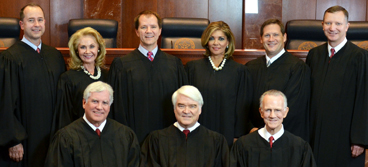© 2017 The Texas Lawbook.
By Janet Elliott
Jan. 31 – (AUSTIN) – A Hurricane Ike claim that grew from $11,000 in home repairs to more than $1 million in awarded damages is the eye of a brewing legal storm at the Supreme Court of Texas.
The case could have far-reaching implications for how thoroughly insurance companies must investigate weather-related claims in a state known for hurricanes and hailstorms.
As the high court contemplates the case, major business interests have aligned with the homeowner while the insurance industry has raised questions about “storm-chasing” lawyers.

“This windstorm case is a viral lawsuit type that, since landfall of Hurricane Ike in September 2008, has grown to such a magnitude that it is creating serious disruptions to an orderly property insurance market in Texas,” Hugh Rice Kelly wrote in a letter brief for Texans for Lawsuit Reform.
The insurance industry says plaintiffs’ lawyers are filing a rising number of lawsuits after wind or hail storms. Some of these cases attempt to recover policy benefits as “bad faith” damages even after judgments have resolved policy claims in the insurers’ favor.
“Certainty in Texas law will assist not only in the handling of claims but also in pricing policies, which is largely determined by loss payment rates,” said Catherine Hanna in a brief for the Insurance Council of Texas.
On the other side, commercial property owners – including auto dealers, energy service firms and rural hospitals – warn of potential abuses by insurers.
“It is easy to imagine a situation in which an insurer deliberately fails to investigate a policyholder’s claim, remaining willfully blind to the extent of the policyholder’s damages and using its inadequate investigation as a pretext to justify the refusal to pay for a covered loss,” Russell Post wrote in a brief for Cameron, a Schlumberger company that manufactures pressure control technologies. Post is a partner at Houston’s Beck Redden.

Extent of Damage Disputed
Six weeks after Hurricane Ike struck the Texas coast in September 2008, Montgomery County homeowner Gail Menchaca noticed loose roof shingles and made a claim. She also sought payment for food loss and damage to a fence, electrical box and sprinkler system.
San Antonio-based insurance giant USAA dispatched an independent claims adjuster who observed a few missing shingles and the detached electrical box. He found no visible damage to the fence other than normal wear and estimated the total repair at $700, less than the policy deductible.
After a similar investigation by a USAA employee, Menchaca sued the company in June 2009. She requested treble damages, exemplary damages, attorney’s fees and interest.
At trial, USAA stipulated to $3,300 in needed electrical repairs. The parties disputed the extent of damages to the roof and fence.
Menchaca was represented by Steve Mostyn, a well-known Houston attorney who has attracted attention at the Texas Capitol for his high volume of claims against the Texas Windstorm Insurance Association, an insurer of last resort in 14 coastal counties and part of Harris County.
In answer to different questions, the jury found that USAA had complied with the policy terms but failed to conduct a reasonable investigation. It awarded Menchaca $11,350 in damages caused by the hurricane and $130,000 in attorney fees for the trial. It awarded no fees for an appeal.
USAA moved for judgment in its favor on the basis that “when no breach of contract is found, there can be no bad faith or extra-contractual liability as a matter of law.” State District Judge Fred Edwards rendered judgment in favor of Menchaca and awarded $164,371 for past damages, interest and attorney fees – including $15,000 for appeals.
USAA’s appeal was transferred from the 9th Court of Appeals in Beaumont to the 13th Court of Appeals in Corpus Christi under a docket equalization order from the Texas Supreme Court.
The appeals court held that the jury’s answers were not in irreconcilable conflict.
“The jury’s finding that USAA committed a violation of the insurance code rendered the no-breach-of-contract finding immaterial because the charge instructed the jury to award the same damages regardless of which theory of liability was adopted,” Justice Dori Contreras Garza wrote for the three-judge panel.
Supreme Court Ponders Jury Answers
During arguments before the Supreme Court in October, justices focused on the jury questions and answers. The lawyers raised issues of precedent and policy.
Wallace Jefferson, who represented USAA, urged the court to focus on its 1998 holding in Provident American Insurance Co. v. Castañeda, which said that failure-to-investigate damages must be separate from damages that would have resulted from a wrongful denial of a claim.
“Look at the causation,” Jefferson said. “The investigation didn’t cause the damages. The hurricane caused the damages.”
Jefferson, a former Supreme Court chief justice, is a partner at Alexander Dubose Jefferson & Townsend in Austin.
Jennifer Bruch Hogan, who represented Menchaca, said the court has never held that an insurance company “cannot be liable for policy benefits that it would have paid and should have paid had it conducted a reasonable investigation.”
Hogan said the court should not require a policyholder to suffer an “independent injury” aside from loss of policy benefits. She said the Texas Legislature in 2015 rejected a bill that would have imposed such a requirement.
“The Legislature heard testimony on that amendment and ultimately both houses voted it down,” said Hogan of Houston’s Hogan & Hogan. “This is not an argument that the court should now accept.”
Click on the link below to watch oral arguments in USAA Texas Lloyds Co. v. Gail Menchaca, No. 14-0721
http://www.texasbarcle.com/CLE/SCPlayer.asp?sCaseNo=14-0721
© 2017 The Texas Lawbook. Content of The Texas Lawbook is controlled and protected by specific licensing agreements with our subscribers and under federal copyright laws. Any distribution of this content without the consent of The Texas Lawbook is prohibited.
If you see any inaccuracy in any article in The Texas Lawbook, please contact us. Our goal is content that is 100% true and accurate. Thank you.
